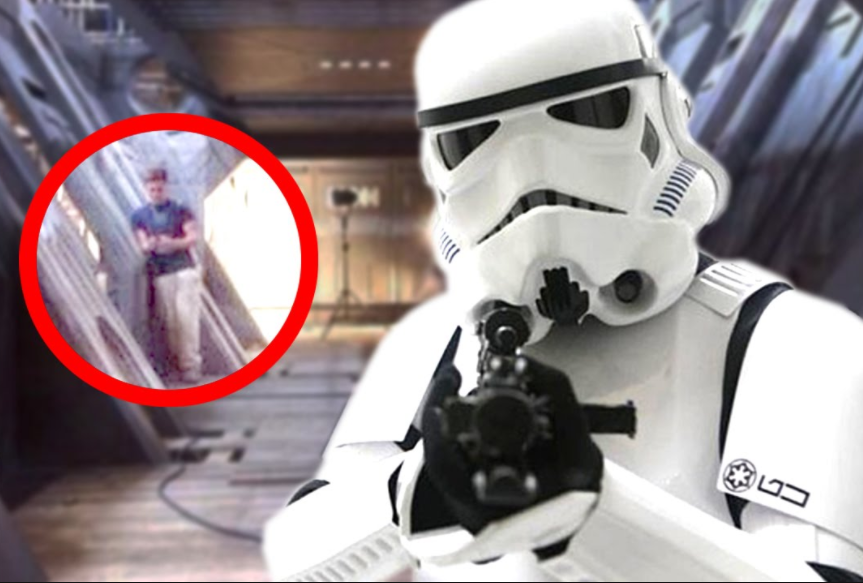Have you ever seen the movie North by Northwest? There's a moment, in the background,
你看过电影《西北偏北》吗?背景中有这样的一瞬间,
where a little boy plugs his ears right before a gun goes off.
一名小男孩在枪响前塞住耳朵。
And in Pretty Woman, Julia Roberts is eating a croissant in one shot and a pancake in the next.
在《风月俏佳人》(Pretty Woman)中,朱莉娅·罗伯茨(Julia Roberts)第一次吃的是羊角面包,第二次吃的是煎饼。
Little mistakes like these are in almost every movie you've ever seen,
你看过的所有电影中几乎都会出现这样的小错误,
but you've probably never noticed them—even though they're right there on the screen in front of you.
但你可能从未注意到它们——即使它们就出现在你面前的屏幕上。
It's weird. You'd think noticing things that are out of place would be an evolutionary advantage.
这很奇怪。你可能会认为,注意到不该出现的事物是一种进化优势。
But it turns out that our brains aren't actually that good at perceiving things.
但事实证明,实际上我们的大脑并不擅长感知事物。
It's more than your eyes recording whatever's going on in front of them—
不仅仅是眼睛在记录眼前发生的事情——
your brain has to interpret the image they produce.
大脑必须对生成的图像进行解释。
And when it prioritizes what it thinks is important, sometimes you don't notice what's right in front of your face.
当大脑优先考虑它认为重要的事情时,有时你会忽略眼前发生的事情。
You can miss more than just small mistakes: In a famous experiment conducted in 1999,
你错过的不仅仅是小错误:1999年的一个著名实验中,
subjects watched a short video of two groups of people tossing around a basketball.
受试者观看了两组人投掷篮球的短片。
Some wore white clothes, and the others wore black clothes.
有的穿着白色的衣服,其他人穿着黑色的衣服。
The subjects were asked to count the number of times the players wearing a particular color passed the ball.
受试者被要求计算穿特定颜色衣服的球员传球的次数。
But while they were busy counting, a person wearing a gorilla suit walked right through
但当他们正忙着数的时候,一个穿着大猩猩衣服的人径直走过。
the shot, thumped her chest, and walked off! About half of the subjects didn't notice the gorilla walk through at all.
子弹击中了她的胸部,然后走开了!大约一半的受试者根本没有注意到大猩猩行走。
If you've taken the test and didn't notice it either, don't feel bad—your brain was busy at the time.
如果你参加了测试,也没注意到的话,不必难过,那时你的大脑很忙。
When you don't notice an unexpected change because you're focusing on something else,
你没有注意到一个意料之外的变化,因为你关注在别的事情上,
that's called inattentional blindness. And it can tell you a lot about how our brains process the world around us.
我们称之为“无意视盲”。它能告诉你大脑是如何处理我们周围的世界。
When you're focusing on something, your brain will automatically filter out information it thinks is irrelevant.
当你专注于某事时,大脑会自动过滤掉它认为不相关的信息。
So when you're concentrating on counting people passing a basketball, your brain ignores everything else—
所以当你集中精力计算人们传球的次数时,大脑会忽略其他一切事物——
even a gorilla walking across the screen.
甚至一只大猩猩从屏幕上走过。
Something similar happens when you're watching a movie where there's a mistake:
当你在看一部有错误的电影时会发生类似的事情:
your brain focuses your attention on the most important things,
你脑把注意力集中在最重要的事情上,
and a little boy plugging his ears in the back of the room isn't as important as the main character in mortal danger right in front of you.
一个小男孩在房间后面堵住耳朵,并不像你眼前置身危险的主角一样重要。

Your brain kind of has to pick something to focus on,
你的大脑需要选择一些东西来集中注意力,
because even though our eyes have a pretty wide field of view, they can only focus on a very small area at a time.
因为即使我们的视野相当广阔,他们一次只能集中在一个非常小的区域。
Eye tracking experiments have shown that we tend to focus our gaze on other people's hands and faces—
眼球追踪实验表明,我们倾向于把目光集中在别人的手和脸上——
two huge sources of information when we communicate with each other.
我们相互交流时的两大信息来源。
And yet, in Pretty Woman, Julia Roberts was holding a croissant in her hand in one shot, which turned into a pancake in the next.
然而,在《风月俏佳人》中,朱莉娅·罗伯茨手里拿着的羊角面包在下个场景变成了煎饼。
If your brain considers hands and faces important, you'd think you'd notice something changing in her hand.
如果你的大脑认为手和脸重要,你认为自己会注意到她手上的变化。
But you don't, because your brain also tries to correct for continuity errors.
但你没有,因为你的大脑也试图纠正连续性错误。
In 2014, researchers at UC Berkeley looked into this by asking subjects to match the orientation of a white bar
2014年,加州大学伯克利分校的研究人员通过让受试者将白条的方向与屏幕上多次闪现的
to a black bar that flashed on the screen, over and over again.
黑条相匹配来研究这一问题。
But the subjects weren't very good at matching the angles of the bars.
但受试者并不擅长匹配白条和黑条的角度。
They tended to choose an angle that was an average of the three most recent bars they'd seen.
他们倾向于选择一个角度,这个角度是他们最近三次所见黑白条的平均值。
The team suggested that this mistake is your brain trying to make sure your experience of reality has the same kind of continuity that you'd expect from a movie.
研究团队认为,错误的产生是因为大脑试图确保人的现实体验和从电影中的期待保持一致的连续性。
Sometimes, that involves blending your experience over about 15 seconds to be as smooth as possible,
有时候,这需要在15秒内将你的经历尽可能流畅地衔接起来,
in what's known as a continuity field. So if the input from your eyes shows Julia Roberts' breakfast changing between shots,
在所谓的连续场景中,如果你眼睛的输入显示是镜头间朱莉娅·罗伯茨的早餐变化,
your brain will pretend it's just a glitch in the Matrix and ignore it to keep you from being confused.
你的大脑会假装这只是矩阵中的一个小故障,然后忽略它,以免你感到困惑。
Focusing like this can be really helpful when, say,
像这样的聚焦非常有用,
you're trying to have a conversation with someone at a crowded, noisy party,
你试图在一个拥挤嘈杂的聚会上和某人交谈,
or follow the story and characters in a convoluted spy thriller.
或者是讲述一部错综复杂的间谍惊悚片里的故事和人物。
But it also means that sometimes you'll miss things that are right in front of you.
但这也意味着有时候你会错过眼前的东西。
It's a little unsettling that you can miss something as significant as a gorilla walking across your field of vision,
有点令人不安的是,你可能会错过一些重要的东西,比如大猩猩进入你的视野。
and it's important to know that our brains work that way,
知道我们的大脑是这样工作的很重要,
especially when it comes to things like eyewitness testimony in court cases.
特别是当涉及到法庭上的目击者证词时。
But it's normal not to notice little mistakes in movies, or even big, unexpected things.
但在电影中注意不到小错误,甚至是大的、意想不到的事情,都是很正常的。
Your brain is just trying to make you see what it thinks you're supposed to see.
你的大脑只是试图让你看到它认为你应该看到的东西。
Thanks for focusing your attention on this episode of SciShow Psych,
感谢收看本期的心理科学秀,
and thanks to our patrons on Patreon for making this show possible.
感谢Patreon为我们的节目提供赞助。
For more on weird human quirks, you can go to youtube.com/scishowpsych and subscribe.
想了解更多关于人类不可思议的行为,请访问并订阅youtube.com/scishowpsych。












